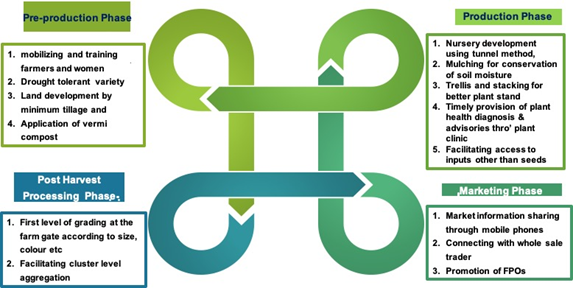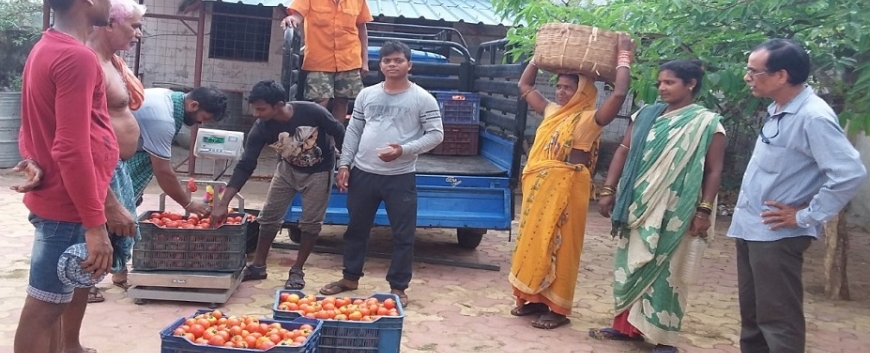Farmer Producer Organizations to improve value chains and smallholder adaptation to climate change
Farming communities in Ganjam district of Odisha state have been facing climate risks from variations in rainfall pattern, high temperature and increasing high intensity tropical cyclones. The impacts of such climate risks compounded by the pre-existing vulnerabilities make farming unstable and unviable among smallholders. Eighty percent of the people in the district depend primarily on agriculture and 88% of the farmers are smallholders. Paddy, maize, finger millet, grain legumes, sesame, groundnut and vegetables are the important crops grown in the area. The climate risks have implications in both production and post-production processes, thus need inputs and support on climate smart technologies and adaptation measures to build better adaptive capacity. The poor awareness and adoption of climate resilient technologies and practices among farmers, inadequate storage and marketing facilities, and lack of access to post harvest support make the farmers more vulnerable to adverse climate change impacts.
In this backdrop, the project RESILIENCE is piloting initiatives to build the smallholders adaptive capacity and resilience. These include:
- Building producer collectives to leverage economies of scale in production and marketing among smallholders,
- Participatory technology demonstration in the field to build their knowledge and skills on climate smart technologies and
- Harnessing the strength of digital tools to build forward, backward and lateral linkages with partners and among farmers.
About 126 men and women farmers were virtually mobilized and organized into farmer producer organization (FPO) in October 2020 in Chikrada panchayat during the midst of pandemic. The main objectives of the FPO is to enable access to training in climate resilient technologies and quality inputs (seeds, bio-based inputs and pesticides), and at the same time increase access to market for a better price, engage in value addition and converging with Government line departments and other stakeholders.
In the Rabi 2020-2021, RESILIENCE project promoted the cultivation of tomato in clusters consisting of 118 farmers covering 25 Ha. Capacity building programmes were organized on the following climate resilient technologies in different stages of the tomato value chain (see figure).

As a first outcome, 1500 kgs of tomato produced was graded at farmgate collected from 24 farmers in a cluster. Cooperation and support through the FPO enabled farmers’ fair market price, correct weighment including a 10% commission fee and immediate payment. Such a transparent process is inspiring other farmers to join the FPO or create new ones in other areas. Efforts are being taken to bring more women farmers into such platforms to facilitate sustainable access to climate resilient technologies and improved value chains and thus women empowerment in the farming sector in the rural areas of Odisha.


